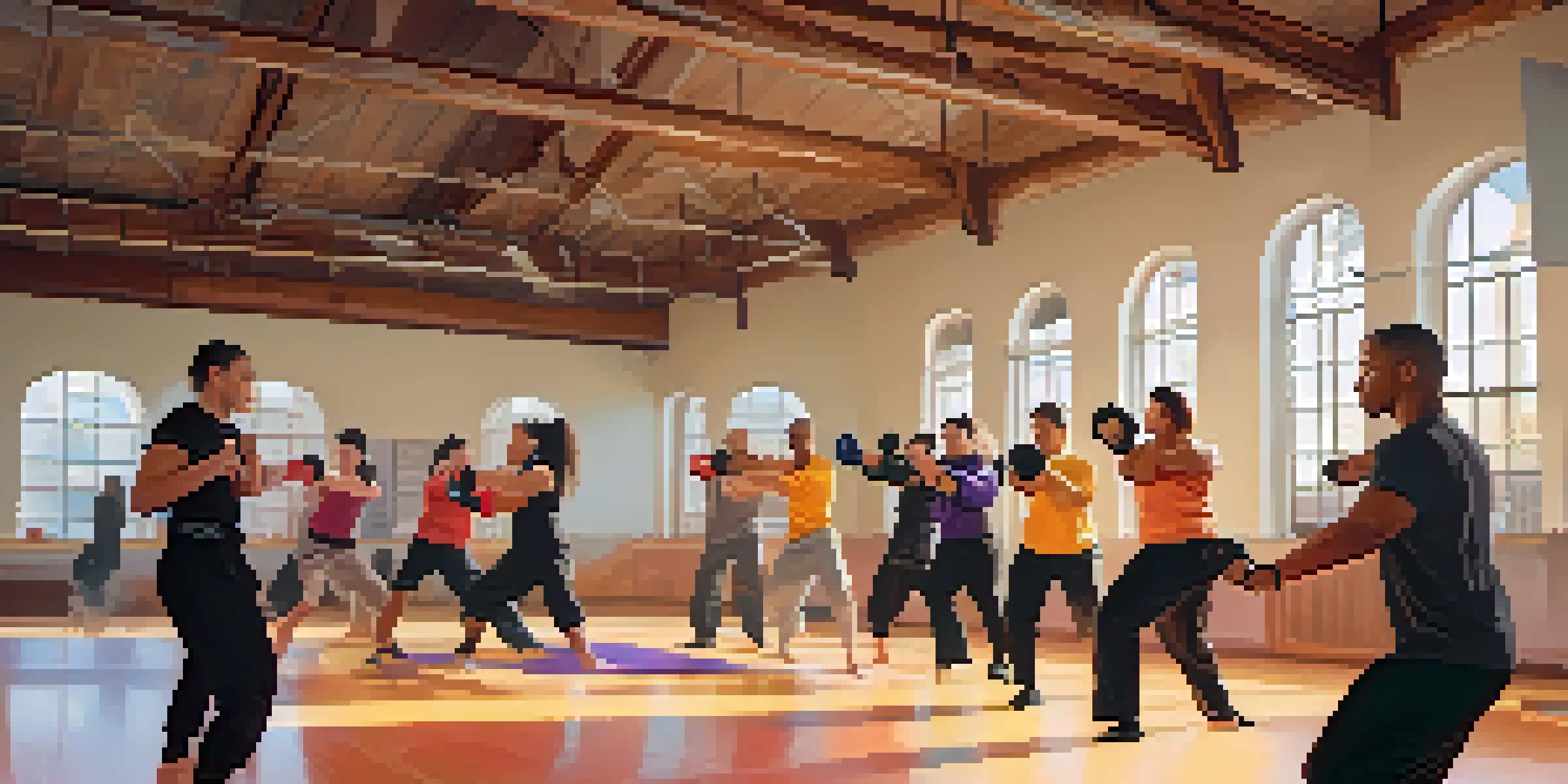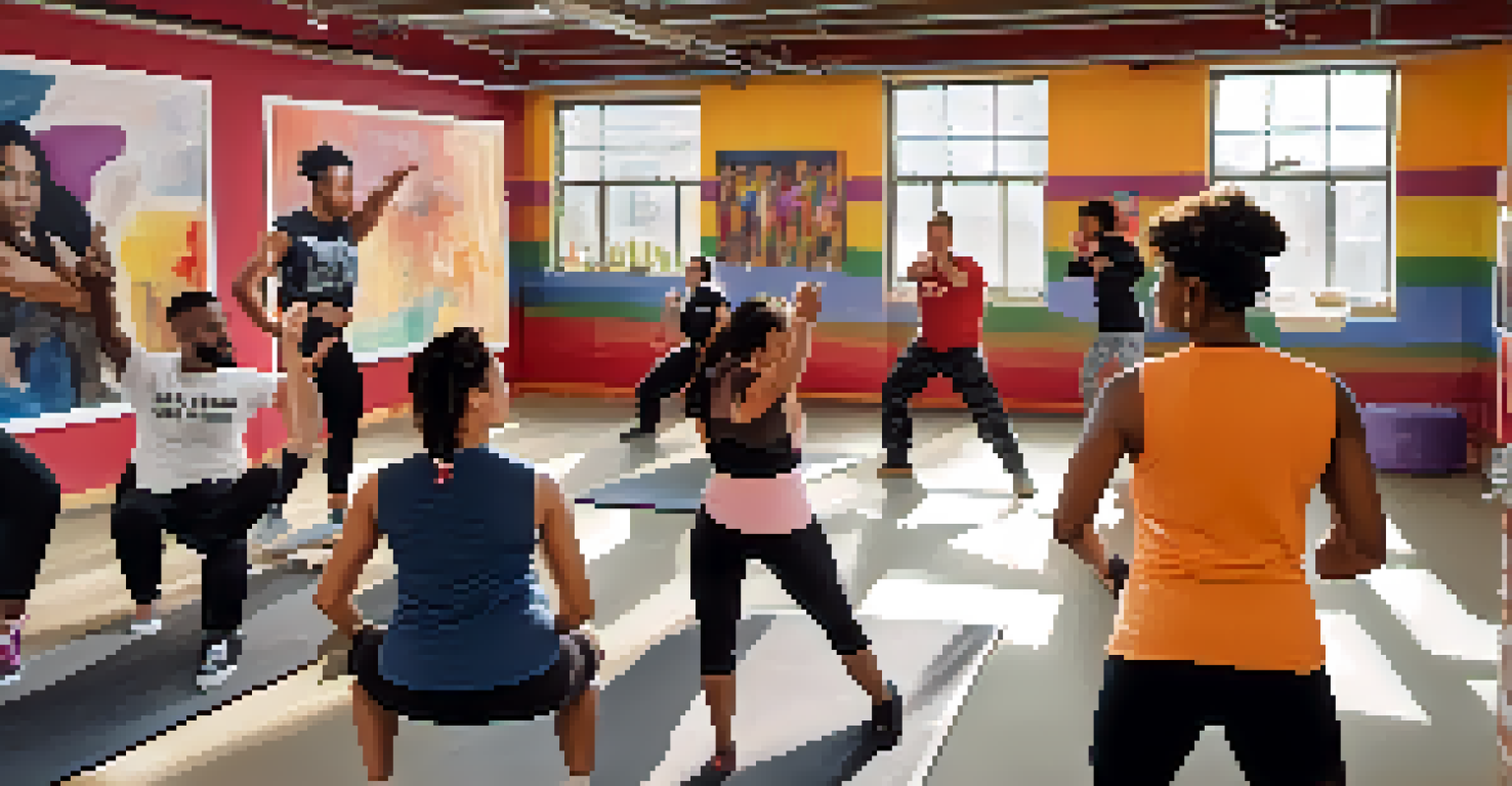Understanding Self Defense: A Guide for LGBTQ+ Individuals

The Importance of Self Defense for LGBTQ+ Individuals
Self-defense is a critical skill for everyone, but for LGBTQ+ individuals, it can be especially vital. Unfortunately, hate crimes and violence against the LGBTQ+ community remain prevalent, making awareness and preparedness essential. Understanding self-defense can empower individuals, boost confidence, and foster a sense of security in everyday situations.
Self-defense is not just a skill; it's a form of empowerment that can transform fear into confidence.
Moreover, self-defense isn't just about physical techniques; it’s about awareness and prevention. Recognizing potential threats in your environment can often keep you safe before a situation escalates. By learning self-defense, individuals can take control of their safety and well-being, transforming fear into empowerment.
Ultimately, self-defense training helps create a supportive community where LGBTQ+ individuals can connect, share experiences, and learn from each other. This collective understanding can be a source of strength, promoting not only personal safety but also community resilience.
Types of Self Defense Techniques to Consider
When it comes to self-defense, there are various techniques and styles that individuals can explore. From martial arts like Brazilian Jiu-Jitsu to Krav Maga, each discipline offers unique strategies for defending oneself. Finding a style that resonates can make training more enjoyable and effective.

For those who prefer less physical confrontation, self-defense classes often incorporate verbal de-escalation techniques. Learning how to communicate effectively in tense situations can be just as important as physical skills. This approach not only helps avoid conflict but also empowers individuals to assert their boundaries confidently.
Self-Defense Empowers LGBTQ+ Safety
Learning self-defense not only boosts confidence but also fosters a sense of security among LGBTQ+ individuals.
It's crucial to choose a training program that understands and respects the unique challenges faced by LGBTQ+ individuals. Look for instructors who foster a safe, inclusive environment where everyone can learn at their own pace, ensuring that training is both effective and supportive.
Finding the Right Self Defense Class
Choosing the right self-defense class is a personal journey that can greatly impact your training experience. Start by researching local classes specifically designed for LGBTQ+ individuals or those that promote inclusivity. This ensures that the environment is welcoming and supportive, which is essential for effective learning.
The best protection any woman can have... is courage.
Consider reaching out to instructors or attending introductory sessions to gauge their teaching style and philosophy. A good instructor will prioritize both physical techniques and emotional safety, fostering an atmosphere where you feel comfortable and encouraged. Don't hesitate to ask questions about their experience with LGBTQ+ issues to ensure a good fit.
Additionally, look for classes that emphasize self-defense in real-life scenarios. Practical training that mimics potential situations can build your confidence and competence, equipping you with the skills to react effectively when needed. Remember, the right class should empower you, leaving you feeling stronger and more capable.
Emotional and Mental Aspects of Self Defense
Self-defense is not solely about physical strength; the emotional and mental aspects are equally vital. Developing a strong mindset can help you react more effectively in high-stress situations. Techniques such as visualization and positive self-talk can foster resilience and confidence in your abilities.
Moreover, understanding the psychology of violence can be beneficial. Recognizing the warning signs of aggression or hostility can help you avoid confrontations altogether. This awareness allows you to make informed decisions about when to engage or disengage, enhancing your overall safety.
Choosing Inclusive Training Programs
Selecting self-defense classes that prioritize inclusivity ensures a supportive environment for effective learning.
Lastly, remember that self-defense training can also serve as a therapeutic outlet. Engaging in physical activity and connecting with others who share similar experiences can help reduce anxiety and build community. Embracing these emotional elements can create a holistic approach to personal safety.
Legal Considerations in Self Defense
Understanding the legal aspects of self-defense is crucial for anyone considering training. Laws surrounding self-defense can vary significantly from one location to another, so it's essential to be informed about your rights and responsibilities. Knowing when and how you can legally defend yourself can provide peace of mind.
In many places, the use of force must be proportional to the threat faced. Learning the nuances of local laws can help you make informed decisions in critical moments. Resources such as legal workshops or consultations with legal professionals can help clarify these important aspects.
Additionally, being aware of your rights can empower you to advocate for yourself in various situations, whether in a physical confrontation or when interacting with law enforcement. Knowledge of the law can be a powerful tool in ensuring your safety and the safety of others.
Building a Supportive Community
One of the greatest strengths of the LGBTQ+ community is its resilience and support for one another. Engaging in self-defense training can create bonds among participants, fostering a sense of camaraderie. This community aspect can be a powerful motivator, encouraging individuals to continue their training and support each other's journeys.
Consider joining local LGBTQ+ organizations or online forums that focus on self-defense and personal safety. Sharing experiences, resources, and tips can enhance your knowledge and provide encouragement. Building connections with others who prioritize safety can create a strong network of support.
Community Resilience Through Training
Engaging in self-defense training helps build a strong supportive community among LGBTQ+ individuals, enhancing personal safety.
Moreover, participating in community events or workshops can amplify awareness around self-defense issues within the LGBTQ+ community. By coming together, you can advocate for safer spaces and promote inclusivity, making a difference beyond personal safety.
Continuing Your Self Defense Journey
Self-defense is a lifelong journey that extends beyond initial training. Once you have acquired basic skills, consider exploring advanced techniques or related disciplines such as fitness training or mental resilience workshops. Continuous learning can keep your skills sharp and boost your confidence over time.
Regular practice is key to maintaining your self-defense abilities. Seek out opportunities to train consistently, whether through scheduled classes, practice sessions with friends, or even solo drills at home. The more you practice, the more instinctive your reactions will become in real-life situations.

Finally, don’t forget to reflect on your progress and celebrate your achievements along the way. Acknowledging your growth not only boosts your confidence but also reinforces your commitment to personal safety and empowerment, ensuring that your self-defense journey remains fulfilling and impactful.